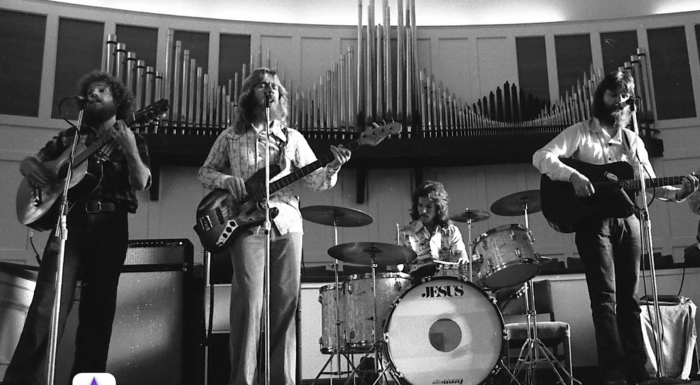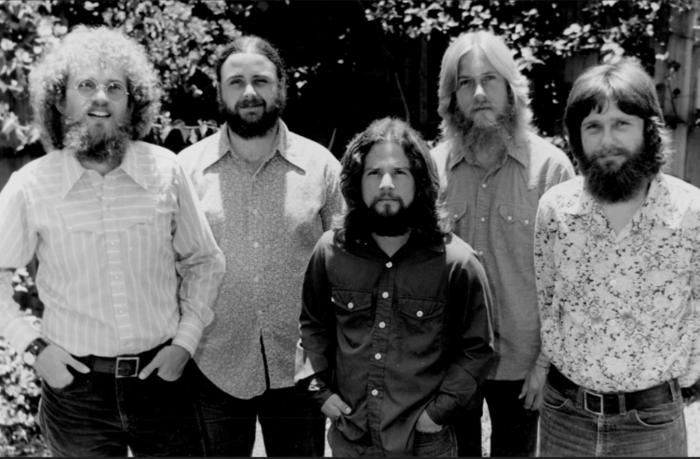
Jay Truax and Tommy Coomes were on the frontlines of the Jesus Revolution of the 1960s, when a handful of long-haired hippies in Southern California became the unlikely soundtrack to a spiritual awakening.
More than five decades later, the two surviving co-founders of the band LoveSong believe the time is “ripe” for another one.
“The time is ripe,” Truax told The Christian Post. “I’ve been a Christian since I was 19, 20 years old, and I’ll be 78 coming up in September. You take for granted the fact that you know the Lord, but at this time, if I weren’t a Christian, I don’t know what I would be thinking. There’s so much division, there’s so much hatred, there’s so much false stuff. It’s perplexing to me. I believe that the time is right for another outpouring. And I think it’s happening in places.”
Coomes added: “My message to the Church is, do what happened in the Jesus Movement. You older people, facilitate what the young people are hungry for. Don’t ignore it, don’t push them out. People fed us, they never condemned us or scolded us. They saw that God was doing something. My problem sometimes with the Church is that we don’t know how to talk to non-Christian people like our neighbors. I don’t care where it is, if you’re going to Starbucks, be friendly, make a bridge.”
That longing for revival drives “A Band Called LoveSong: The Music & Movement of the Jesus Revolution,” a three-part docuseries premiering Sept. 19 on Prime Video and SalemNOW.
The series traces how five musicians — Truax, Coomes, Chuck Girard, Fred Field and John Mehler — traded LSD and nightclubs for Bibles and baptism services, helping spark what historians call America’s largest spiritual awakening.
Truax remembers the pivot vividly. He recalled dropping out of high school, spending his days surfing and experimenting with drugs while immersing himself in the music of the Beatles and Jimi Hendrix.
By 1967, he had fallen in with a group of “Christian hippies” that included Chuck Girard and Denny Carell. Though the band dabbled in mescaline and peyote, they were also drawn to the teachings of Jesus in the “red-letter” portions of the Bible.
“I really believe … that Denny Carell actually led me to the Lord in ’67,” Truax said. “So my life has changed.”
Meanwhile, Coomes’ own searching spanned continents. He served in the U.S. Army and was stationed in Germany from 1967 to 1969, and remembers seeing Jimi Hendrix perform in Stuttgart and sensing a broader restlessness among his generation.
“Everybody was kind of feeling the same thing worldwide,” he said, describing a cultural revolution where millions of young people were convinced “there’s got to be something better.”
When he returned to California, he and his friends hit rock bottom. “It seemed like everything we looked into was just a dead end,” he said. “And a friend came down to see us from Pasadena … told us about this little church called Calvary Chapel and the hippie preacher. We were curious enough to go down there one time, and these people just welcomed us. Church was not the place we were looking for answers. Within a month, four of us out of the six that were living together got saved.”
From those conversions, LoveSong was born.
“We were standing in the kitchen in Laguna Beach … going, we got to get out of this drug culture,” Coomes recounted. “We had already written about six spiritual songs that were about Jesus. We just sat there and said, we’ve got to tell our generation about Jesus. We’ve got to make a record. And that’s what we did. There was no contemporary Christian music model.”

The documentary shows how, once formed, LoveSong didn’t resemble anything the American Church had seen. Their reception in churches was often frosty. “Well, you know what? Church shocked us too,” Coomes laughed.
Truax recalled the suspicion they faced: “We’d be in the back room praying and really scared, and we would go like, we have nothing in common with these people. They already hate us. And within three songs, people would be crying. Also, the Holy Spirit would help them understand we weren’t against them. We were for them.”
Sometimes the culture clash was unintentional comedy. Truax reflected on the night Field testified at a Seventh-day Adventist church that he’d been “delivered from vegetarianism.” The congregation, many of them vegetarians, burst out laughing.
More than half a century later, “A Band Called LoveSong” frames those stories within the broader sweep of American religious history. The film includes rare footage and interviews with artists such as Michael W. Smith, Jeremy Camp and Phil Keaggy, as well as archival appearances by Chuck Smith and reflections from evangelist Greg Laurie, who came of age in the movement (as shown in the hit 2023 film “Jesus Revolution.“)
“We look at this as a true historic document,” Coomes said. “This is real history. Some scholars say this may be the biggest spiritual awakening that’s ever happened in America, and I would not limit it to America.”
The release comes just weeks after the death of Girard, the band’s frontman, and, according to his bandmates, serves as a tribute to the storied musician.
“I’m just happy that he got to see the film completed before he passed,” Coomes said. “It is largely about honoring him now, but it’s been an eight-year project, and the last four have been really intense.”
According to his bandmates, Girard remained deeply involved until the end. “We’re jaded because we know every little, tiny thing in here, every edit, every photo, for eight years. You wouldn’t believe our Zoom calls,” Coomes said. “The Beatles used to say, if we don’t all agree on something, we don’t do it. And that’s kind of our approach on this, too.”
The duo shared how the process of creating the documentary required meticulous archival work — clearing photos, securing footage and stitching together 50 years of history.
“Everything surprised me,” Truax said. “We had to clear photos from 50-something years ago … it was very, very expensive. I know we spent way more on post-production than we did on the production.”
The series closes with the question: Will there be another Jesus Movement?
Coomes pointed to the energy of youth, recalling Billy Graham’s words at Explo ’72: “There’s enough power in the stadium to change the world.”
“These revivals tend to happen with youth. As we get older, we get focused on work, vacation, retirement. Young people are free. My message to the church is, facilitate what the young people are hungry for. Adopt them, feed them, love them,” he said.
Truax underscored the urgency; after years of avoiding churches, he still remembers the emptiness of walking into sanctuaries where no one greeted him. “When you walk into a place where you sense God’s presence … you get curious enough to start coming back,” he said.
“And I hope that happens with young people. It’s not rocket science. Love God, love people. Teach the word, pray for people. Pretty amazing.”
“Our hope and our prayer,” Coomes said, “How long has it been, Lord? Do it again.”
“A Band Called LoveSong: The Music & Movement of the Jesus Revolution” will be available for streaming on Prime Video via Prime Video Direct, and SalemNOW starting Sept. 19.
Leah M. Klett is a reporter for The Christian Post. She can be reached at: leah.klett@christianpost.com

















